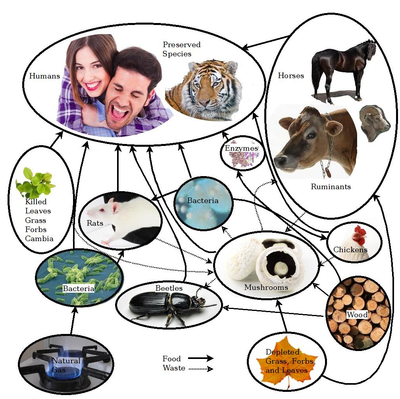Source
- Seth D. Baum, David C. Denkenberger, Joshua M. Pearce. Alternative Foods as a Solution to Global Food Supply Catastrophes, Solutions 7(4): 31-35 (2016). open access

Abstract
Analysis of future food security typically focuses on managing gradual trends such as population growth, natural resource depletion, and environmental degradation. However, several risks threaten to cause large and abrupt declines in food security. For example, nuclear war, volcanic eruptions, and asteroid impact events can block sunlight, causing abrupt global cooling. In extreme but entirely possible cases, these events could make agriculture infeasible worldwide for several years, creating a food supply catastrophe of historic proportions. This paper describes alternative foods that use non-solar energy inputs as a solution for these catastrophes. For example, trees can be used to grow mushrooms; natural gas can feed certain edible bacteria. Alternative foods are already in production today, but would need to be dramatically scaled up to become the primary food source during a global food supply catastrophe. Scale-up would require extensive depletion of natural resources and difficult social coordination. For these reasons, large-scale use of alternative foods should be considered only for desperate circumstances of food supply catastrophes. During a catastrophe, alternative foods may be the only solution capable of preventing massive famine and maintaining human civilization. Furthermore, elements of alternative foods may be applicable to non-catastrophe times, such growing mushrooms on logging residues. Society should include alternative foods as part of its contingency planning for food supply catastrophes and possibly during normal times as well.
See also

- Feeding Everyone No Matter What - The full book main page
- David Denkenberger and Joshua Pearce, Feeding Everyone No Matter What: Managing Food Security After Global Catastrophe , 1st Edition, Academic Press, 2015
- Free Preview: Google books
- Cover on Academia
- Facebook page
- Alternative Foods as a Solution to Global Food Supply Catastrophes
- Resilience to global food supply catastrophes
- Feeding Everyone if the Sun is Obscured and Industry is Disabled
- Cost-Effectiveness of Interventions for Alternate Food to Address Agricultural Catastrophes Globally
- Feeding Everyone: Solving the Food Crisis in Event of Global Catastrophes that Kill Crops or Obscure the Sun
- Food without sun: Price and life-saving potential
- Cost-effectiveness of interventions for alternate food in the United States to address agricultural catastrophes
- Micronutrient Availability in Alternative Foods During Agricultural Catastrophes
- Preliminary Automated Determination of Edibility of Alternative Foods: Non-Targeted Screening for Toxins in Red Maple Leaf Concentrate
- Open Source Software Toolchain for Automated Non-Targeted Screening for Toxins in Alternative Foods
- Scaling of greenhouse crop production in low sunlight scenarios
- Potential of microbial protein from hydrogen for preventing mass starvation in catastrophic scenarios
- U.S. Potential of Sustainable Backyard Distributed Animal and Plant Protein Production During & After Pandemics
- Global distribution of forest classes and leaf biomass for use as alternative foods to minimize malnutrition
- Long-term cost-effectiveness of interventions for loss of electricity/industry compared to artificial general intelligence safety
- Long term cost-effectiveness of resilient foods for global catastrophes compared to artificial general intelligence safety
- Rapid repurposing of pulp and paper mills, biorefineries, and breweries for lignocellulosic sugar production in global food catastrophes
- Nutrition in Abrupt Sunlight Reduction Scenarios: Envisioning Feasible Balanced Diets on Resilient Foods
- Methane Single Cell Protein: securing protein supply during global food catastrophes
- Killing two birds with one stone: chemical and biological upcycling of polyethylene terephthalate plastics into food
- How Easy is it to Feed Everyone? Economic Alternatives to Eliminate Human Nutrition Deficits
- Quantifying Alternative Food Potential of Agricultural Residue in Rural Communities of Sub-Saharan Africa
- Yield and Toxin Analysis of Leaf Protein Concentrate from Common North American Coniferous Trees
- Toxic Analysis of Leaf Protein Concentrate Regarding Common Agricultural Residues
- Towards Sustainable Protein Sources: The Thermal and Rheological Properties of Alternative Proteins
Additional Information
- ALLFED
- Dave Denkenberger Publications
- OSE Wiki "Synfood" (i.e. protein and other dietary components from microbial organisms fed on gas or other hydrocarbons)






